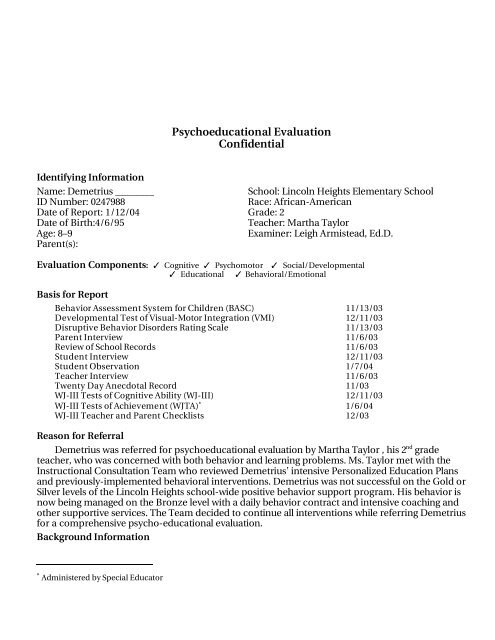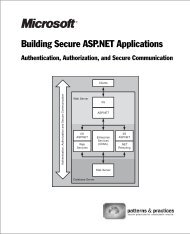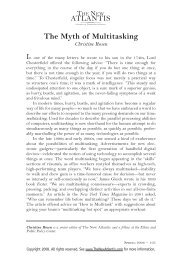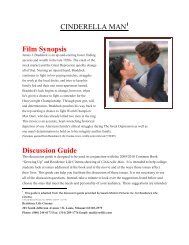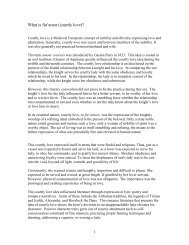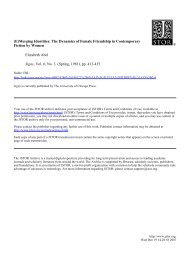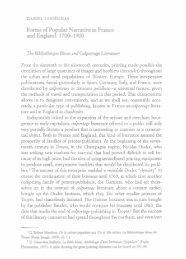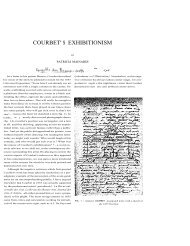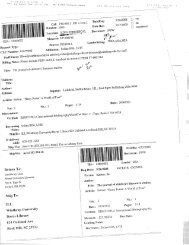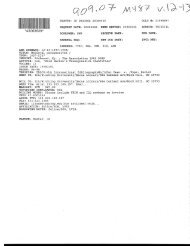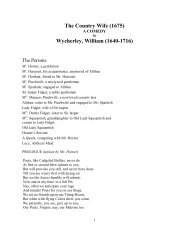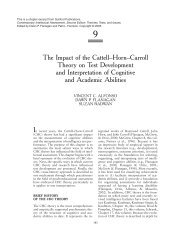Psychoeducational Evaluation Confidential
Psychoeducational Evaluation Confidential
Psychoeducational Evaluation Confidential
You also want an ePaper? Increase the reach of your titles
YUMPU automatically turns print PDFs into web optimized ePapers that Google loves.
<strong>Psychoeducational</strong> <strong>Evaluation</strong><br />
<strong>Confidential</strong><br />
Identifying Information<br />
Name: Demetrius ________ School: Lincoln Heights Elementary School<br />
ID Number: 0247988 Race: African-American<br />
Date of Report: 1/12/04 Grade: 2<br />
Date of Birth:4/6/95 Teacher: Martha Taylor<br />
Age: 8–9 Examiner: Leigh Armistead, Ed.D.<br />
Parent(s):<br />
<strong>Evaluation</strong> Components: ✓ Cognitive ✓ Psychomotor ✓ Social/Developmental<br />
✓ Educational ✓ Behavioral/Emotional<br />
Basis for Report<br />
Behavior Assessment System for Children (BASC) 11/13/03<br />
Developmental Test of Visual-Motor Integration (VMI) 12/11/03<br />
Disruptive Behavior Disorders Rating Scale 11/13/03<br />
Parent Interview 11/6/03<br />
Review of School Records 11/6/03<br />
Student Interview 12/11/03<br />
Student Observation 1/7/04<br />
Teacher Interview 11/6/03<br />
Twenty Day Anecdotal Record 11/03<br />
WJ-III Tests of Cognitive Ability (WJ-III) 12/11/03<br />
WJ-III Tests of Achievement (WJTA) * 1/6/04<br />
WJ-III Teacher and Parent Checklists 12/03<br />
Reason for Referral<br />
Demetrius was referred for psychoeducational evaluation by Martha Taylor , his 2 nd grade<br />
teacher, who was concerned with both behavior and learning problems. Ms. Taylor met with the<br />
Instructional Consultation Team who reviewed Demetrius’ intensive Personalized Education Plans<br />
and previously-implemented behavioral interventions. Demetrius was not successful on the Gold or<br />
Silver levels of the Lincoln Heights school-wide positive behavior support program. His behavior is<br />
now being managed on the Bronze level with a daily behavior contract and intensive coaching and<br />
other supportive services. The Team decided to continue all interventions while referring Demetrius<br />
for a comprehensive psycho-educational evaluation.<br />
Background Information<br />
* Administered by Special Educator
Demetrius _____, p. 2<br />
The following information was obtained from Demetrius’ cumulative folder and from<br />
interviews and checklists.<br />
Cumulative Record: After participating in the Double Oaks Bright Beginnings preschool<br />
program, Demetrius enrolled in kindergarten at Oaklawn Elementary. He participated in 1 st grade at<br />
Oaklawn but was retained. Demetrius repeated 1 st grade at Lincoln Heights where he is now in the<br />
2 nd grade.<br />
During kindergarten, Demetrius was reported to have difficulties with excessive talking, poor<br />
self-control, a low rate of task completion and poor peer relationships. His academic ratings suggest<br />
that, by the end of the year, he was performing on grade level.<br />
During 1 st grade, Demetrius continued to have difficulty with paying attention, staying on task,<br />
completing his work, following rules, and completing homework. His academic ratings reflect below<br />
grade level achievement in all areas. He was retained in 1 st grade.<br />
While repeating 1 st grade, Demetrius’ class participation and homework completion improved.<br />
However, he continued to have difficulty with other behavior expectations. Some academic areas<br />
were rated as on grade level. Others were still below grade level.<br />
Demetrius has had satisfactory attendance. He has not previously been referred for an<br />
evaluation.<br />
Demetrius’ health history has been unremarkable. A brief screening for Attention-Deficit<br />
Hyperactivity Disorder in 11/03 resulted in Ms. _____ consulting with a pediatrician regarding<br />
medical treatment. He began treatment with Concerta on 11/17/03. On days when he took the<br />
medication, his behavior improved dramatically. Medication was discontinued by his physician after<br />
about one month.<br />
Parent Report: Demetrius lives with his mother and two younger siblings, ages 10 months and 3<br />
years, but often stays with his grandmother on school nights. His mother drives a bus and his<br />
grandmother works in a school cafeteria, both for Charlotte-Mecklenburg Schools.<br />
Demetrius’ mother was 12 years old when he was born. During pregnancy, Demetrius's mother<br />
had no significant health problems. Demetrius's delivery was normal. Immediately after birth,<br />
Demetrius was healthy. Demetrius's mother remembers him as an active infant and toddler but a<br />
screaming and stubborn one. His motor and language skills developed earlier than for most other<br />
children. Ms. _____ reported that Demetrius is usually in good health and is physically fit. At night,<br />
he typically sleeps for 8 or 9 hours, often so soundly that he cannot easily be woken.<br />
Demetrius attended preschool, beginning at age 3. He seemed to learn things more easily, or<br />
sooner, than other children did. He seemed to develop social skills more easily than other children<br />
also. No behavior management problems were recalled but Ms. _____ believes that Demetrius<br />
might have learning problems and has been concerned about this for about a year.<br />
At the time of this assessment, Ms. _____ described Demetrius as unmotivated and hyperactive.<br />
At times, Demetrius seems unhappy, but overall, his mood varies normally. At home, he often<br />
fidgets with his hands or feet, or squirms; outside the home, he often runs about or climbs<br />
excessively when it is inappropriate. Demetrius often seems to be "on the go" as if "driven by a<br />
motor." He often talks excessively and has difficulty playing quietly. He often has difficulty awaiting<br />
his turn and often interrupts or intrudes on others. Ms. _____ said that Demetrius likes some things<br />
about school but dislikes other things; his level of effort toward schoolwork varies. Demetrius also<br />
seems to have difficulty organizing and sustaining attention during his tasks and play activities. He<br />
often avoids, dislikes, or is reluctant to engage in tasks that are difficult for him. He is often easily<br />
distracted.
Demetrius _____, p. 3<br />
Ms. _____ reported that Demetrius demonstrates very serious problem behaviors at home;<br />
these include overactivity and impulsiveness. At times he is uncooperative behavior and sometimes<br />
a little aggressive.<br />
Teacher Report Ms. Taylor described Demetrius as sometimes argumentative, disobedient, and<br />
defiant. She said that he needs much more one-to-one attention and completes less schoolwork<br />
than most boys his age. She reported several behaviors that may be inhibiting Demetrius’ classroom<br />
performance. He frequently fails to give close attention to details or makes careless mistakes. He<br />
seems to have difficulty organizing and sustaining attention during his tasks and play activities. He<br />
often does not seem to listen when spoken to directly, does not follow through on instructions, and<br />
fails to finish his work. Demetrius's oral responses to questions are very slow and hesitant. He often<br />
avoids, dislikes, or is reluctant to engage in tasks that are difficult for him. He often loses his<br />
personal belongings and forgets what he is supposed to do. Demetrius is easily distracted. He often<br />
leaves his desk when he is expected to remain seated. When seated, Demetrius often fidgets with his<br />
hands or feet, or squirms in his seat. Outside the classroom, he often runs about or climbs<br />
excessively when it is inappropriate. He usually seems to be "on the go" as if "driven by a motor."<br />
Demetrius often talks excessively and has difficulty playing quietly. He often has difficulty awaiting<br />
his turn and often interrupts or intrudes on others. Ms. Taylor is most concerned about the way<br />
Demetrius responds to academic tasks requiring sustained mental effort; she believes this seriously<br />
impairs Demetrius's classroom performance.<br />
Ms. Taylor also reported that Demetrius demonstrates aggressive behaviors in the classroom<br />
that, at times seem impulsive, but at other times, seem deliberate. She has observed both verbally<br />
and physically aggressive behavior as well as the use of vulgar language.<br />
Ms. Taylor rated Demetrius's levels of basic reading skill, reading comprehension, mathematics<br />
calculation, mathematics reasoning, basic writing skill, and written expression as average. His levels<br />
of oral expression and listening comprehension were rated as limited.<br />
Demetrius is being instructed at the 2 nd grade level in basic reading skills, reading<br />
comprehension, math calculation, math reasoning, basic writing skills, and written expression.<br />
Classroom oral expression and listening comprehension demands are at a 2 nd grade level.<br />
Anecdotal Reports: Records from the school’s Positive Behavior Support (PBS) program<br />
indicate that Demetrius was frequently consequated with written “Silver Slips” for excessive talking,<br />
noncompliance, disruptive behavior, disrespect, anger, and conflict with other students. He was<br />
suspended several times because of office behavior referrals. Demetrius was not successful on the<br />
“Gold Level” of the PBS program and was placed on a “Bronze Level” individual behavior plan with<br />
daily behavior reports to the office and to his mother.<br />
Two days prior to Demetrius’ starting medication, Ms. Taylor began recording a 20-day<br />
behavior log. On the first two days, she checked 17 categories of inappropriate behavior. After<br />
Demetrius started medication, only 3 behaviors were checked for the next four days: fidgeting,<br />
interrupting, and being out of his seat. For the next two weeks, the log shows days with as few as 3<br />
behaviors checked and as many as 23. Demetrius reported on several occasions that he didn’t’ take<br />
his medication for some reason such as being at his grandmother’s house. Suspecting a compliance<br />
problem, school staff contacted Demetrius’ mother and she began supervising his taking medicine<br />
each morning. Ms. Taylor reported 4 days in a row of perfect behavior—no checks at all.<br />
Recently, Demetrius’ mother ran out of medication before getting a recheck appointment with<br />
his pediatrician. His behavior deteriorated dramatically. He was in trouble every day and was sent<br />
to the office several times. When Demetrius was seen by his pediatrician, reportedly she decided not<br />
to renew his prescription. Instead, she referred him for counseling for his behavior problems.
Demetrius _____, p. 4<br />
Results of <strong>Evaluation</strong><br />
Behavioral Observations<br />
Classroom: Demetrius was observed during reading class on a day when he had not taken<br />
medication. He was seated in a cluster of desks with three other students. During the 30-minute<br />
observation, Demetrius’ time on task was minimal. He looked at his book several times when he was<br />
redirected but most of the time, he was looking around the room or at other students. He did read<br />
a short passage when called upon but he read dysfluently and had difficulty decoding any unfamiliar<br />
words.<br />
Demetrius was in constant motion throughout the observation, kneeling or “dancing” in his<br />
chair, swinging his arms around, standing next to or sprawling across his desk, and fidgeting with<br />
objects. Whenever Ms. Taylor took something away from him, he would quickly find something to<br />
fiddle with. At times, Demetrius sucked his thumb and he made noises constantly. He talked to or<br />
attempted to talk to his peers throughout the lesson.<br />
When Ms. Taylor gave the class a test, Demetrius took a very long time to start doing anything<br />
with it. When an administrator came into the room to speak with the teacher, Demetrius was<br />
completely distracted and stopped working. When he did start working on the test, Demetrius<br />
began copying answers from the student next to him.<br />
Assessment Session: Demetrius readily accompanied this examiner to his office which<br />
provided adequate testing conditions. Rapport was easily achieved and maintained throughout the<br />
evaluation. Demetrius said he had taken Concerta that morning.<br />
Demetrius seldom initiated conversation but was responsive to questions and comments. He<br />
did not smile much or display humor; he generally avoided eye contact. Demetrius’ level of<br />
language complexity seemed below average and he displayed a considerable amount of dialect. He<br />
used a rather sparse vocabulary and elaborated his answers less than children his age typically do.<br />
During a semi-structured interview, Demetrius described his family life in positive and<br />
conventional terms. He reported that he likes the nonacademic aspects of school but that reading<br />
and math are hard for him. His answers to questions related to social/emotional functioning were<br />
generally conventional. However, in response to three different questions, Demetrius said that he<br />
gets in trouble or feels sad or gets mad because, “people tell lies” about him.<br />
When testing began, Demetrius seldom responded impulsively and attempted all tasks<br />
presented. He did have problems with attention and persistence. He seemed to get bored easily and<br />
lose interest when he had to persist with routine tasks for more than a minute or two. Overt<br />
hyperactivity was not apparent but he did touch things, play with his fingers and fidget with objects.<br />
The results of this assessment are considered to be a valid estimate of Demetrius’ academic<br />
achievement and academic aptitude within his current educational placement.<br />
Test Results and Interpretation<br />
Academic Aptitude: The Woodcock-Johnson-III Tests of Cognitive Ability (WJ-III) was administered<br />
as a measure of academic aptitude. The WJ-III is a standardized intelligence test used to assess a<br />
range of cognitive abilities that represent a sample of what knowledge and skills a person has<br />
learned and can use at the time of testing. These abilities, measured by a range of reasoning and<br />
conceptual tasks, reflect a person’s current ability to solve problems, think abstractly, deal with new<br />
situations, and profit from experience. The WJ-III provides standard scores with an average range of<br />
85 to 115 and allows comparisons to determine an individual’s relative strengths and weaknesses.
Demetrius _____, p. 5<br />
General Intellectual Ability: This score is a measure of Demetrius’ overall intellectual<br />
functioning. His percentile rank (24) and standard score (90) fall in the average range of academic<br />
aptitude at this time.<br />
Verbal Ability: The Comprehension-Knowledge subtests are a measure of verbal ability and<br />
provide information about language-based acquired knowledge, including the ability to<br />
communicate that knowledge and reason using that knowledge. Demetrius’ verbal ability is within<br />
the average range of scores obtained by others at his age level, as shown by his percentile rank (25)<br />
and standard score (90).<br />
Thinking Ability: Four groups of subtests—Visual-Spatial Thinking, Auditory Processing, Long-<br />
Term Retrieval, and Fluid Reasoning—measure various aspects of Demetrius’ reasoning ability to<br />
process information that has been placed in short-term memory but can’t be processed<br />
automatically. Demetrius’ thinking ability is within the average range of scores obtained by others at<br />
his age level, as shown by his percentile rank (35) and standard score (94).<br />
Cognitive Efficiency: This cluster includes subtests which measure the ability to process<br />
information automatically. Automatic processing facilitates more complex cognitive processing<br />
including tasks in the Thinking Ability cluster. Demetrius’ cognitive efficiency is within the lowaverage<br />
range of scores obtained by others at his age level, as shown by his percentile rank (22) and<br />
standard score (88).<br />
Cognitive Ability Clusters: The following sections provide additional information about<br />
Demetrius’ performance on the WJ-III narrow cognitive ability clusters.<br />
When compared to others of his age, Demetrius's cognitive abilities are in the average range in<br />
Auditory Processing (the ability to analyze, synthesize, and discriminate auditory stimuli, including<br />
the ability to process and discriminate speech sounds that may be presented under distorted<br />
conditions), Long-Term Retrieval (the ability to store and retrieve information), Fluid Reasoning<br />
(the ability to reason, form concepts, and solve problems using unfamiliar information or novel<br />
procedures), Visual-Spatial Thinking (the ability to perceive, analyze, synthesize, and think with<br />
visual patterns, including the ability to store and recall visual representations), Short-Term Memory<br />
(the ability to hold information in immediate awareness and use it within a few seconds),<br />
Comprehension-Knowledge (the breadth and depth of language-based knowledge, including the<br />
ability to communicate (especially verbally) one's verbal knowledge and comprehension), and<br />
Phonemic Awareness (the knowledge and skills related to analyzing and synthesizing speech sounds).<br />
Processing Speed measures Demetrius's ability to perform simple and automatic cognitive tasks<br />
rapidly, particularly when under pressure to maintain focused attention. Demetrius's processing<br />
speed standard score is within the low-average to average range (percentile rank range of 17 to 29;<br />
standard score range of 86 to 92) for his age. His processing speed is limited to average; he will<br />
probably find age-level tasks requiring cognitive speediness difficult.<br />
Working Memory measures Demetrius's ability to hold information in immediate awareness<br />
while performing a mental operation on the information. Demetrius's working memory standard<br />
score is within the low average to average range (percentile rank range of 13 to 29; standard score<br />
range of 83 to 91) for his age. His working memory capacity is limited; it is likely that he will find<br />
age-level tasks requiring complex processing of information in immediate memory very difficult.<br />
Clinical Interpretation of Cognitive Fluency and Executive Processing: Demetrius's speed in<br />
performing simple to complex cognitive tasks is limited to average. Specifically, on tasks requiring<br />
fluency of retrieval from stored knowledge, he gave examples very slowly; his performance was<br />
average. His performance on tasks requiring speed of forming simple concepts was limited to<br />
average; however, he made decisions quickly and very accurately. Demetrius's performance on
Demetrius _____, p. 6<br />
tasks requiring speed of direct recall of simple vocabulary was limited; he specified names for<br />
pictures slowly but accurately.<br />
Demetrius's overall ability to plan, monitor, and arrive at solutions to problems is limited to<br />
average. For example, on tasks measuring his ability to plan and implement solutions to problems,<br />
his performance was average. His adaptive learning and flexibility in thinking were limited to<br />
average; he did not appear to benefit from or use feedback. Demetrius's ability to maintain focus on<br />
a task amid visual distracters was limited; his task vigilance was low.<br />
Although Demetrius's overall ability to focus his attention on relevant stimuli for information<br />
processing purposes is limited to average, he performed differently on tasks requiring the ability to<br />
allocate attentional resources. His performance on tasks requiring the ability to attend selectively to<br />
and discriminate speech sounds amid the effects of auditory distortion was average; his<br />
performance on tasks requiring ability to sustain his attention was limited.<br />
Visual-Motor Development: The VMI was administered to assess visual-motor integration or eyehand<br />
coordination. Demetrius slowly and carefully copied the VMI shapes, talking himself through<br />
several drawings. He noticed several mistakes and tried to correct them. He achieved a standard<br />
score of 76 which is an age-equivalent score of 6-6 and is in the significantly below average range at<br />
the 5th percentile. These results suggest a weakness in visual-motor skill development which could<br />
be a factor with classroom tasks involving writing.<br />
Academic Achievement: The WJ-III Tests of Achievement was administered by special educator<br />
Cathy Phelan to obtain an estimate of Demetrius’ current academic achievement. The WJ-III<br />
provides standard scores with an average range of 85 to 115. The following section summarizes<br />
Demetrius’ performance on each academic subtest cluster.<br />
Broad Reading includes reading decoding, reading speed, and the ability to comprehend<br />
connected discourse while reading. Demetrius's reading standard score is within the low average<br />
when compared to others of his age. His overall reading ability is limited; reading tasks above the<br />
age 8-1 level will be quite difficult for him.<br />
Reading Comprehension measures Demetrius's reading vocabulary and his ability to<br />
comprehend connected discourse while reading. Demetrius's reading comprehension standard<br />
score is within the low average range for his age. His reading comprehension is limited; reading<br />
comprehension tasks above the age 7-9 level will be quite difficult for him.<br />
Broad Written Language includes production of written text, including spelling ability, writing<br />
fluency, and quality of written expression. Demetrius's written language standard score is within<br />
the low average range (percentile rank range of 10 to 19; standard score range of 81 to 87) for his<br />
age. His overall written language ability is limited; tasks measuring effective expression in written<br />
language above the age 8-4 level will be quite difficult for him.<br />
Written Expression measures Demetrius's fluency of production and quality of expression in<br />
writing. Demetrius's written expression standard score is within the low to low average range for his<br />
age. His overall ability to express himself in writing is limited to average; writing fluency tasks above<br />
the age 8-4 level will be quite difficult for him.<br />
Mathematics Reasoning includes mathematical knowledge and reasoning. Demetrius's<br />
mathematics reasoning standard score is within the low average for his age. His mathematics<br />
reasoning ability is limited; math reasoning tasks above the age 7-11 level will be quite difficult for<br />
him.
Demetrius _____, p. 7<br />
Math Calculation Skills measures Demetrius's computational skills and automaticity with basic<br />
math facts. Demetrius's mathematics calculation skills standard score is within the low to low<br />
average range for his age. His mathematics calculation skills are limited; math calculation tasks<br />
above the age 8-1 level will be quite difficult for him.<br />
Academic Processing: Demetrius's academic skills are limited. In particular, his sight reading<br />
ability, math calculation skill, and spelling are limited. The fluency with which Demetrius performs<br />
academic tasks is limited to average. Specifically, his fluency with mathematics problems is limited<br />
to average. His fluency with reading and writing tasks is limited. Demetrius's ability to apply his<br />
academic skills is limited. For example, his writing ability is limited to average. His passage<br />
comprehension ability and quantitative reasoning are limited.<br />
Behavioral/Emotional Status:<br />
Disruptive Behavior Disorders Rating Scale: Demetrius’ mother completed this rating scale<br />
which assesses the presence and severity of 18 characteristics of ADHD, 8 characteristics of<br />
Oppositional Defiant Disorder and 15 symptoms of Conduct Disorder. His mother indicated that 11<br />
of 18 symptoms “often” or “very often” were typical of Demetrius’ behavior. The symptoms<br />
included on this scale are:<br />
Behavioral Symptom<br />
Parent<br />
Endorsed<br />
1. Inattentive to details ✔<br />
2. Difficulty sustaining attention ✔<br />
3. Doesnʼt seem to listen when spoken to<br />
4. Doesnʼt follow through on instructions<br />
5. Difficulty organizing tasks and activities<br />
6. Avoids tasks that require mental effort<br />
7. Loses things necessary for tasks ✔<br />
8. Is easily distracted ✔<br />
9. Is forgetful in daily activities<br />
10. Fidgets with hands or feet or squirms in seat ✔<br />
11. Inappropriately leaves seat<br />
12. Runs about or climbs excessively<br />
13. Difficulty playing quietly<br />
✔<br />
14. Is ”on the go” ✔<br />
15. Excessive talking ✔<br />
16. Blurts out answers ✔<br />
17. Has difficulty awaiting turn ✔<br />
18. Interrupts or intrudes on others ✔<br />
19. Loses temper<br />
20. Argues with adults<br />
21. Actively defies or refuses compliance w/adult requests<br />
✔<br />
22. Deliberately annoys people ✔<br />
23. Blames others for his/her mistakes or misbehavior<br />
24. Is touchy or easily annoyed by others<br />
✔<br />
25. Is angry and resentful<br />
26. Is spiteful or vindictive<br />
✔<br />
The first nine items on this rating scale relate to the Primarily Inattentive type of ADHD. The<br />
teacher ratings were below the 93rd percentile cutoff score. The second nine items relate to the
Demetrius _____, p. 8<br />
Primarily Impulsive-Hyperactive type of ADHD. Teacher ratings were above the 93 rd percentile<br />
cutoff score.<br />
These rating scales also include 8 items which relate to Oppositional Defiant Disorder.<br />
Demetrius’ parent endorsed none of these items; the teacher endorsed 4 of 8 which exceeds the cut<br />
score for this disorder.<br />
Finally, the parent scale includes items related to conduct problems in the community that are<br />
symptomatic of Conduct Disorder. Ms. _____ reported that Demetrius has had problems with<br />
bullying and being physically cruel to others, and with lying. The number of characteristics<br />
endorsed does not exceed the cutoff score for Conduct Disorder at this time.<br />
The BASC Teacher Rating Scales was completed by Demetrius’ teacher to assess any<br />
behavioral/ emotional problems, and provide information about his social competence. This scale<br />
provides T-scores with an average range of 40 to 60. In general, scores between 60 and 70 constitute<br />
an at-risk range and indicate potential or developing problems that should be monitored carefully.<br />
Scores of 70 and above constitute the clinically significant range and indicate a high level of<br />
maladaptive behavior. On the Adaptive Scales, scores between 31 and 40 are considered at risk;<br />
scores of 30 and below are considered clinically significant. All at risk or clinically significant scores<br />
are shown in boldface type in the following table.<br />
Scale T-Score Percentile<br />
Hyperactivity 78 99<br />
Aggression 90 99<br />
Conduct Problems 95 99<br />
Externalizing Problems Composite 91 99<br />
Anxiety 45 37<br />
Depression 77 97<br />
Somatization 42 18<br />
Internalizing Problems Composite 56 77<br />
Attention Problems 71 97<br />
Learning Problems 67 93<br />
School Problems Composite 70 96<br />
Atypicality 82 98<br />
Withdrawal 61 87<br />
Adaptability 30 3<br />
Social Skills 26 1<br />
Leadership 37 9<br />
Study Skills 30 1<br />
Adaptive Skills Composite 28 1<br />
Behavioral Symptoms Index 80 99<br />
The composite scores provided by the teacher’s ratings indicate a high level of behavior<br />
problems at school. Demetrius’ Behavioral Symptoms Index score is a broad measure of his<br />
social/emotional functioning. It is within the clinical range at the 80th percentile.<br />
Externalizing Problems: Demetrius’ Externalizing Composite score was in the clinical range. This<br />
composite is characterized by disruptive behaviors such as aggression and hyperactivity. Children<br />
with undercontrolled behaviors of the externalizing type readily come to the attention of teachers<br />
and other adults because they disrupt the activities of both peers and adults, they are often<br />
unresponsive to adult direction and they have more problematic relations with peers. The<br />
Externalizing Composite score includes the Aggression scale which assesses both verbal and<br />
physical aggression. Items measuring verbal aggression refer to such behaviors as arguing, name
Demetrius _____, p. 9<br />
calling, criticizing, blaming and verbally threatening. Items which assess physical aggression include<br />
breaking other’s possessions and hitting others.<br />
The Conduct Problems scale is closely related to the Aggression scale but focuses on behaviors<br />
that are antisocial and rule-breaking rather than behaviors directed against others. These include<br />
cheating, stealing, and other behaviors sometimes labeled as delinquency or conduct disorder. It<br />
should be noted that conduct disorder often worsens with age and is complicated by factors such as<br />
ineffective parenting practices, academic failure and peer rejection. These factors can also lead to<br />
depressed mood.<br />
Internalizing Problems: Demetrius’ teacher rated him within the clinical range on the<br />
Internalizing Composite scale. This composite measures depression, anxiety, and similar difficulties<br />
that are not usually marked by acting out behavior. His teacher noted characteristics of depression<br />
but not anxiety or somatization, the tendency to have numerous medical complaints, most of which<br />
can’t be traced to poor medical health.<br />
School Problems: Demetrius’ teacher rated his behavior in the clinical range on the School<br />
Problems composite. This composite consists of the Attention and Learning Problems scales and<br />
reflects academic difficulties including problems of motivation, attention, learning, and cognition. A<br />
high score on this composite is a sign that the teachers perceive behaviors that are very likely to<br />
interfere with achievement.<br />
Atypicality and Withdrawal Scale Scores: These two scale scores are not included in any of the<br />
various composites. Demetrius’ Atypicality scale score was in the clinical range. This scale assesses<br />
unusual behaviors sometimes associated with psychotic behavior. However, such behaviors may<br />
also be observed in children with disruptive behavior disorders such as ADHD. In Demetrius’ case,<br />
atypical behaviors included staring blankly and singing or humming to himself.<br />
Demetrius Withdrawal score was in the at-risk range. This scale measures a child’s tendency toward<br />
shyness and to evade others to avoid social contact. In mild form, it may represent a symptom of<br />
depression. It’s also associated with being neglected or rejected by peers. An elevated score on this<br />
scale is consistent with Demetrius’ scores on the Internalizing Composite.<br />
ADHD: The BASC results are consistent with a diagnosis of ADHD,. His Hyperactivity and<br />
Attention Problems subscales which assess the core ADHD characteristics of hyperactivity,<br />
inattention and impulsivity had elevated scores. Behaviors associated with ADHD often result in<br />
elevated scores on the Aggression, Learning Problems, Conduct Problems, and Depression scales.<br />
In addition, low scores on the Social Skills and Adaptability scales are common among children<br />
diagnosed with ADHD.<br />
Adaptive Skills: In contrast to the preceding, the BASC adaptive scales measure positive<br />
behaviors. The Adaptability scale relates to a child’s temperament and assesses the ability to adjust<br />
to changes in routine and new teachers, to shift from one task to another, and to share things with<br />
other children. The Leadership scale assesses competencies related to good community and school<br />
adaptation and behaviors that may be associated with leadership potential. The Social Skills scale<br />
emphasizes interpersonal skills such as admitting mistakes, complimenting others, offering<br />
assistance, and greeting skills. The Study Skills scale includes items related to problem solving,<br />
achievement motivation, and academic organizational skills. High scores on these scales represent<br />
positive or desirable characteristics.<br />
As shown in the table, Demetrius was rated by his teacher in the at-risk or clinical range on the<br />
Adaptability, Social Skills, and Leadership scales. He was rated in the average range on the Study<br />
Skills scale. Parent ratings provided average scores on the Adaptability, Social Skills and Leadership<br />
scales.
Demetrius _____, p. 10<br />
Summary<br />
Demetrius is an 8-year-old 2nd grader referred by his teacher because behavior and learning<br />
problems. His background includes below-average achievement and retention in 1 st grade. Behavior<br />
problems were apparent beginning in kindergarten and included attention deficits, excessive talking,<br />
poor self-control, hyperactivity, impulsivity, and poor peer relationships. A recent one-month trial<br />
of Concerta showed significant improvements in Demetrius behavior but included several days in<br />
which treatment compliance was questionable.<br />
Current evaluation results Demetrius's overall intellectual ability, as measured by the WJ III GIA<br />
(Ext), is in the average range.<br />
When compared to others at his age level, Demetrius's performance is average in<br />
comprehension-knowledge, long-term retrieval, visual-spatial thinking, auditory processing, fluid<br />
reasoning, short-term memory, and phonemic awareness; and low average in processing speed and<br />
working memory. No discrepancies were found among Demetrius's cognitive abilities.<br />
When compared to others at his age level, Demetrius's performance is low average in broad<br />
reading, reading comprehension, math calculation skills, math reasoning, written language, and<br />
written expression.<br />
When compared to others at his age level, Demetrius's academic skills, his ability to apply those<br />
skills, and his fluency with academic tasks are all within the low average range.<br />
Demetrius’ WJ-III results were used to calculate whether his academic performance is at the<br />
level of his cognitive abilities. Given his abilities, he should have a Broad Reading score of 93 but his<br />
actual score was 86. He should have a Broad Written Language Score of 93; his actual score was 84.<br />
Finally, he should have a Broad Math Score of 94. His actual score was lower at 83. These results<br />
suggest a definite lag in Demetrius’ overall academic achievement..<br />
Demetrius currently exhibits poor social competence and behavioral/emotional problems at<br />
home and school. Both his mother and teachers reported behavior problems beyond normal levels<br />
for boys his age. The pattern of the problems was primarily of an externalizing, aggressive nature.<br />
Demetrius exhibits an aggressive approach to solving social problems. He appears deficient in social<br />
and interpersonal skills. His history includes acts of aggression toward his classmates. Demetrius<br />
has difficulty recognizing his own part in social conflicts, often viewing himself as a victim and<br />
seldom acknowledging the connection between his behavior and its effect on others.<br />
Demetrius currently exhibits many behaviors, both at home and at school, suggestive of an<br />
ADHD diagnosis. In addition, behaviors consistent with a co-morbid diagnosis of Oppositional-<br />
Defiant Disorder were documented.<br />
In the opinion of this examiner, the results of this evaluation are consistent with Demetrius’<br />
eligibility under North Carolina Department of Public Instruction guidelines to receive services in<br />
the program for Behaviorally-Emotionally Disabled (BED) students. However, his IEP Team should<br />
consider the findings of this evaluation and make a decision regarding his classification and<br />
eligibility for services.<br />
Students are eligible to receive services in the BED program if they, after receiving specially<br />
designed educational support services and intervention strategies in the regular educational setting,<br />
still exhibit patterns of situationally inappropriate interpersonal or intrapersonal behavior of such<br />
frequency, duration, and intensity to disrupt their own learning process. A behavioral-emotional<br />
handicap is evidenced by one or more of the following characteristics which cannot be attributed<br />
primarily to physical, sensory, or intellectual deficits:<br />
A. Inability to achieve adequate academic progress (not due to a learning disability).<br />
B. Inability to maintain satisfactory interpersonal and/or intrapersonal relationships.<br />
C. Inappropriate or immature types of behavior or feelings under normal conditions.
Demetrius _____, p. 11<br />
D. A general pervasive mood of unhappiness or depression.<br />
E. A tendency to develop physical symptoms, pains or fears associated with personal or<br />
school problems.<br />
This report has demonstrated that Demetrius’ behavior problems are of long-standing<br />
duration; problems first manifested in kindergarten. Currently they are of sufficient frequency and<br />
intensity that teacher scores on a standardized behavior rating instrument rated him at the 99th<br />
percentile with regard to overall BED characteristics. As previously noted, Demetrius’ academic<br />
progress is below his expectancy level.<br />
Recommendations. The following are offered for the IEP Team’s consideration:<br />
1. With regard to ADHD, Ms. _____ is encouraged to consult with a pediatrician regarding further<br />
medical treatment. The information provided in this report should prove helpful in that regard. A<br />
multi-modal treatment program involving behavior management procedures, student counseling,<br />
parent education, and attention-focusing medications, is often recommended by physicians to help<br />
children with ADHD. Children can respond quite variably to different medications and dosages.<br />
Therefore, physicians often conduct medication trials for several weeks while they determine a<br />
child’s response and decide on the proper medication and dosage. Because medication effects are<br />
most noticeable during school hours, physicians often request weekly behavior reports from school<br />
to help them monitor medication effects. This evaluator is available to assist with any of these<br />
treatment procedures.<br />
2. Since Demetrius’ lives with both his mother and grandmother, it would be better if he takes any<br />
prescribed medications at school whenever possible.<br />
3. To help Demetrius compensate for his disability in the classroom, the following<br />
recommendations may be helpful:<br />
• Preferential seating as close to the teacher as possible should be provided. Seating in<br />
clusters across from other students is not recommended. Children with ADHD cannon<br />
result impulses to talk and play with peers in these clusters of desks.<br />
• Get the student’s attention before giving directions. Be careful to minimize the number of<br />
components included in each set of directions.<br />
• In order to enhance these students’ attention skills, teachers can add novelty to tasks,<br />
especially at the end of tasks, or, if possible, eliminate repetition within tasks or add activity<br />
to tasks (e.g., working with peers, talking, responding to questions, etc.).<br />
• Because children with ADHD become bored easily and lack the proper motivation to<br />
complete uninteresting tasks, it is often necessary to provide them with lots of ongoing<br />
feedback about their performance. Thus teachers should consider providing these children<br />
with more feedback, both positive and negative, than would be the case for others in the<br />
classroom.<br />
• As much as possible, incentives should be incorporated into school programming. Such<br />
incentives or rewards should be meaningful and delivered in a frequent, immediate, and<br />
consistent manner. To reduce the possibility of the student’s becoming bored with this type<br />
of programming, target behaviors and consequences should be modified periodically.<br />
• Attempt to actively involve the student the student in lessons, perhaps with cooperative<br />
learning.
Demetrius _____, p. 12<br />
• The teacher should have a private understanding with the child about, and periodic one-toone<br />
meetings regarding, the child’s attention deficits. Private reminder cues should be<br />
arranged, i.e. a gentle touch on the shoulder, to redirect attention.<br />
• These children may benefit from a “coach” to assist in organizing homework and in<br />
planning reports and other complex activities.<br />
• The teacher may need to divide the work load into smaller chunks. Many children with<br />
ADHD become overwhelmed by large amounts of work presented at one time.<br />
• Children with ADHD symptoms often benefit from doing errands such as taking messages<br />
to the office. This helps break their day into smaller units and allows for diversion of<br />
overflow energy.<br />
4. Demetrius would benefit from receiving specialized instruction in a small-group,<br />
structured setting. Instruction should provide remediation for his current basic skill deficits and<br />
teach effective problem-solving skills, mnemonic strategies, and good study habits. Regular<br />
education classroom teachers will need to modify their procedures to accommodate his<br />
disability. Demetrius can be expected to experience considerable difficulty without extensive<br />
adaptation of the regular education curriculum. He cannot be taught at his grade level; rather,<br />
efforts should be made to build upon the skills he has mastered. Until his reading skills improve,<br />
he should not be expected to make one year of growth for each year in attendance in school.<br />
Therefore the gap between grade placement and achievement level will widen as he progresses<br />
through the grades.<br />
5. Demetrius’ teachers and parents should not underestimate the discouragement, low effort level<br />
and task avoidance that often occur when a child’s reading skills are as weak as his. Consistent use<br />
of a positive behavior management system intended to reinforce reading, good study habits,<br />
homework completion, etc. will be necessary to support his success. Demetrius’ classroom teacher<br />
and any special education teachers should meet to decide what role each will take in providing him<br />
with remedial instruction in reading and writing, how to reinforce what the other is teaching, and<br />
how to communicate problems and successes as they arise.<br />
6. Counseling should be available as in integral part of Demetrius’ program. A variety of treatment<br />
strategies would likely benefit his behavioral/emotional status:<br />
a. Social skills training, preferably in a group, to rectify specific skill deficits<br />
b. Behavior management procedures to promote prosocial behaviors<br />
c. Aggression replacement training to provide alternatives to conflict and fighting<br />
d. Rational-emotive procedures to address some of Demetrius; unrealistic thoughts<br />
7. Participation in a peer tutoring situation at school would provide an additional opportunity for<br />
Demetrius to develop better social relations. The best approach might be to have Demetrius tutor<br />
another child in some area of relative academic strength, thereby enhancing his self-esteem and<br />
sense of social responsibility.<br />
Leigh Armistead, Ed.D., NCSP<br />
School Psychologist<br />
Note: Supporting data are on file in the Lincoln Heights Student Services Office.
GIA: General Intellectual Ability<br />
Gc: Comprehension-Knowledge<br />
Glr: Long-Term Retrieval<br />
Gv: Visual Spatial Thinking<br />
Ga: Auditory Processing<br />
Gf: Fluid Reasoning<br />
Gs: Processing Speed<br />
Gsm: Short-Term Memory<br />
BR: Basic Reading<br />
RC: Reading Comprehension<br />
MC: Math Calculation<br />
MR: Math Reasoning<br />
BW: Basic Writing<br />
WE: Written Expression<br />
Demetrius _____, p. 13
TABLE OF SCORES: Woodcock-Johnson III Tests of Cognitive Abilities and Tests of Achievement<br />
COG norms based on age 8-8; ACH norms based on age 8-9<br />
Demetrius _____, p. 14<br />
CLUSTER/Test Raw AE EASY to DIFF RPI PR SS(68% BAND) GE<br />
GIA (Ext) - 7-8 6-7 9-2 81/90 24 90 (88-92) 2.0<br />
VERBAL ABILITY (Ext) - 7-5 6-3 8-9 76/90 25 90 (86-94) 2.3<br />
THINKING ABILITY (Ext) - 7-11 6-4 11-2 87/90 35 94 (92-97) 2.5<br />
COG EFFICIENCY (Ext) - 7-7 6-10 8-5 70/90 22 88 (85-92) 2.2<br />
COMP-KNOWLEDGE (Gc) - 7-5 6-3 8-9 76/90 25 90 (86-94) 2.3<br />
L-T RETRIEVAL (Glr) - 8-4 5-9 >22 89/90 43 98 (92-103) 2.7<br />
VIS-SPATIAL THINK (Gv) - 7-1 5-4 10-8 83/90 27 91 (87-95) 1.9<br />
AUDITORY PROCESS (Ga) - 9-5 6-11 14-10 92/90 61 104 (98-110) 3.8<br />
FLUID REASONING (Gf) - 7-8 6-9 8-11 78/90 30 92 (89-95) 2.3<br />
PROCESS SPEED (Gs) - 7-9 7-2 8-5 68/90 23 89 (86-92) 2.3<br />
SHORT-TERM MEM (Gsm) - 7-3 6-5 8-5 71/90 27 91 (86-95) 2.1<br />
PHONEMIC AWARE - 9-0 6-5 13-11 91/90 55 102 (96-108) 3.3<br />
WORKING MEMORY - 7-0 6-3 8-1 65/90 20 87 (83-91) 1.8<br />
BROAD ATTENTION - 7-1 6-1 8-4 71/90 15 84 (81-88) 1.7<br />
COGNITIVE FLUENCY - 7-5 6-4 8-10 77/90 23 89 (86-91) 2.1<br />
EXEC PROCESSES - 7-0 5-10 8-5 72/90 13 83 (81-86) 1.7<br />
------------------------------------------------------------<br />
BROAD READING - 7-8 7-4 8-1 43/90 17 86 (84-88) 2.4<br />
BROAD MATH - 7-2 6-7 7-11 53/90 13 83 (80-86) 1.8<br />
BROAD WRITTEN LANG - 7-8 7-1 8-4 63/90 14 84 (81-87) 2.2<br />
READING COMP - 7-3 6-10 7-9 41/90 12 82 (80-85) 1.8<br />
MATH CALC SKILLS - 7-3 6-6 8-1 60/90 10 81 (77-85) 1.9<br />
MATH REASONING - 7-4 6-9 7-11 48/90 16 85 (82-88) 2.0<br />
WRITTEN EXPRESSION - 7-4 6-7 8-4 68/90 12 82 (78-87) 2.0<br />
ACADEMIC SKILLS - 7-9 7-5 8-2 45/90 20 87 (85-89) 2.4<br />
ACADEMIC FLUENCY - 7-8 6-11 8-6 69/90 17 86 (83-88) 2.3<br />
ACADEMIC APPS - 7-2 6-8 7-9 45/90 14 84 (82-86) 1.8<br />
------------------------------------------------------------<br />
Verbal Comprehension - 8-7 7-3 10-2 90/90 49 100 (94-105) 3.2<br />
Visual-Auditory Learning 14-E 9-9 7-1 >19 93/90 64 105 (100-111) 4.0<br />
Spatial Relations 55-D 7-2 5-5 10-10 83/90 32 93 (89-97) 2.0<br />
Sound Blending 17 8-9 6-8 12-0 90/90 51 100 (94-107) 2.8<br />
Concept Formation 14-D 7-3 6-4 8-4 69/90 24 89 (85-93) 2.0<br />
Visual Matching 27-2 7-9 7-3 8-3 57/90 21 88 (85-91) 2.2<br />
Numbers Reversed 8 6-11 6-4 7-10 61/90 25 90 (85-95) 2.0<br />
Incomplete Words 20 9-5 6-1 21 91/90 58 103 (95-111) 4.1<br />
Auditory Work Memory 9 7-0 5-11 8-3 69/90 21 88 (83-93) 1.6<br />
General Information - 6-5 5-5 7-6 55/90 10 80 (74-86) 1.5<br />
Retrieval Fluency 34 6-3 3-7 14-4 84/90 13 83 (76-89) 1.2<br />
Picture Recognition 40-D 7-1 5-2 10-6 83/90 32 93 (89-97) 1.8<br />
Auditory Attention 37 10-8 7-1 >20 94/90 70 108 (101-115) 5.8<br />
Analysis-Synthesis 19-D 8-1 7-1 10-0 86/90 41 97 (92-101) 2.8<br />
Decision Speed 21 7-10 6-11 8-10 78/90 31 93 (89-97) 2.4<br />
Memory for Words 15 7-8 6-6 9-1 80/90 37 95 (89-101) 2.4<br />
Rapid Picture Naming 85 7-4 6-7 8-3 67/90 31 92 (91-94) 2.1
Page 15<br />
CLUSTER/Test Raw AE EASY to DIFF RPI PR SS(68% BAND) GE<br />
Planning - 12-7 4-9 >28 92/90 80 112 (103-122) 7.9<br />
Pair Cancellation 21 6-4 5-7 7-3 40/90 8 79 (76-81) K.9<br />
------------------------------------------------------------<br />
Form A of the following achievement tests was administered:<br />
Letter-Word Identification 39 8-0 7-9 8-4 48/90 28 91 (89-94) 2.7<br />
Reading Fluency 22 7-10 7-5 8-4 59/90 24 89 (87-92) 2.5<br />
Calculation 8 7-3 6-9 7-9 37/90 10 81 (76-86) 1.9<br />
Math Fluency 24 7-2 5-4 9-2 79/90 8 79 (75-83) 1.8<br />
Spelling 24 7-10 7-6 8-3 50/90 21 88 (85-92) 2.4<br />
Writing Fluency 7 7-5 6-6 8-4 66/90 17 86 (80-91) 2.3<br />
Passage Comprehension 17 7-1 6-9 7-6 25/90 12 83 (79-86) 1.8<br />
Applied Problems 24 7-2 6-7 7-9 39/90 17 85 (82-89) 1.8<br />
Writing Samples 11-B 7-3 6-7 8-4 70/90 16 85 (80-91) 1.7<br />
Reading Vocabulary - 7-6 6-11 8-2 59/90 23 89 (86-92) 1.9<br />
Quantitative Concepts - 7-6 6-10 8-2 57/90 17 86 (81-91) 2.1<br />
------------------------------------------------------------<br />
STANDARD SCORES DISCREPANCY Significant at<br />
DISCREPANCIES Actual Predicted Difference PR SD + or - 1.50 SD (SEE)<br />
Intra-Cognitive<br />
COMP-KNOWLEDGE (Gc) 90 95 -5 35 -0.38 No<br />
L-T RETRIEVAL (Glr) 98 93 5 63 +0.34 No<br />
VIS-SPATIAL THINK (Gv) 91 96 -5 34 -0.40 No<br />
AUDITORY PROCESS (Ga) 104 94 10 79 +0.79 No<br />
FLUID REASONING (Gf) 92 94 -2 43 -0.18 No<br />
PROCESS SPEED (Gs) 89 96 -7 31 -0.50 No<br />
SHORT-TERM MEM (Gsm) 91 95 -4 36 -0.35 No<br />
PHONEMIC AWARE 102 94 8 71 +0.54 No<br />
WORKING MEMORY 87 95 -8 27 -0.61 No<br />
------------------------------------------------------------<br />
STANDARD SCORES DISCREPANCY Significant at<br />
DISCREPANCIES Actual Predicted Difference PR SD + or - 1.50 SD (SEE)<br />
Intellectual Ability/Achievement Discrepancies*<br />
BROAD READING 86 93 -7 28 -0.58 No<br />
READING COMP 82 94 -12 14 -1.07 No<br />
BROAD MATH 83 94 -11 16 -0.98 No<br />
MATH CALC SKILLS 81 94 -13 15 -1.05 No<br />
MATH REASONING 85 93 -8 21 -0.82 No<br />
BROAD WRITTEN LANG 84 93 -9 23 -0.74 No<br />
WRITTEN EXPRESSION 82 93 -11 19 -0.86 No<br />
*These discrepancies compare GIA (Ext) with Broad, Basic, and Applied ACH clusters.<br />
STANDARD SCORES DISCREPANCY Significant at<br />
DISCREPANCIES Actual Predicted Difference PR SD + or - 1.50 SD (SEE)<br />
Predicted Achievement/Achievement Discrepancies*<br />
BROAD READING 86 95 -9 19 -0.89 No<br />
READING COMP 82 97 -15 7 -1.45 No<br />
BROAD MATH 83 94 -11 13 -1.11 No<br />
MATH CALC SKILLS 81 93 -12 13 -1.15 No<br />
MATH REASONING 85 94 -9 17 -0.96 No<br />
BROAD WRITTEN LANG 84 94 -10 17 -0.95 No<br />
WRITTEN EXPRESSION 82 94 -12 15 -1.05 No<br />
*These discrepancies compare predicted achievement scores with Broad, Basic, and Applied ACH clusters.


